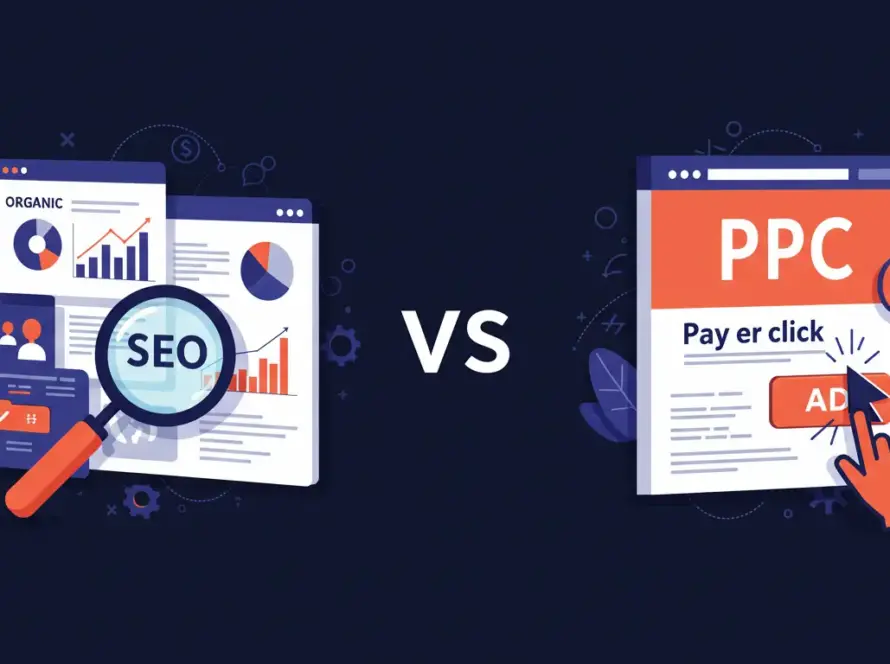You’ve probably been there typing “best digital marketing agency near me” into Google, scrolling through dozens of websites, reading vague promises and glowing reviews that all sound the same. It’s overwhelming. You’re not just looking for help but putting your brand in someone else’s hands.
And the truth is, the wrong agency can do more harm than good. A few wrong moves and you’re left with wasted budget, poor results, and a lot of explaining to do.
That’s why this isn’t just another checklist. It’s a simple, honest guide to help you pick a team that actually gets your business, your goals, and your customers.
Know What You Want Before You Start Looking
Before you start shortlisting agencies or scheduling discovery calls, pause for a minute. Get really clear on what you want. A surprising number of businesses skip this part and that’s how they end up paying for strategies that don’t align with their needs.
Define Your Goals
Ask yourself: what does success look like for you? Is it more sales? More qualified leads? Just better brand visibility?
Different agencies are good at different things. Some are experts in content and SEO, others in performance ads or lead generation funnels. You don’t need the biggest agency, you need the right one for your goals.
Also think about timeframes. Are you looking for a short-term boost, or a long-term partner? There’s a big difference between “I want to run a campaign for an event next month” and “I want to grow my brand steadily over the next year.”
And when setting goals, get specific.
Not “I want more website traffic,” but “I want 50% more qualified leads from our homepage in the next six months.” That kind of clarity helps both you and your agency stay on the same page from day one.
Be Honest About Your Budget
It’s not the fun part, but it matters. Your budget shapes your options. Whether you’re spending $2,000 a month or $10,000, you need to be realistic about what that money can get you.
Think about how you want to structure your spending:
- Do you want a monthly retainer?
- A project-based contract?
- Or a performance-based model tied to results?
Each one has its own pros and cons. And don’t forget to factor in hidden costs. Things like ad spend, software subscriptions, and any extra services that may not be included in the agency’s quote.
Full-Service or Specialist?
This choice depends on your current setup.
If you’re starting from scratch and need help with everything say SEO, ads, content, email, design, a full-service digital marketing agency might make more sense. You get one team, one point of contact, and a strategy where everything works together.
But if you already have a solid foundation or in-house team and just need help with one area (say, PPC or social media), a specialist agency might be the better fit. You’ll get deeper expertise and usually better results in that specific area.
There’s also the hybrid approach, where you work with multiple niche agencies. It can work well but only if you’re okay with managing more moving parts and making sure everyone’s aligned.
How to Find Agencies That Actually Deliver
When you search “best digital marketing agency” you’ll see hundreds of results. But being loud online doesn’t always mean being good. Some of the most effective agencies don’t advertise much at all as they’re too busy getting results for clients.
Look Beyond the First Page of Google
Agencies that show up at the top of search results may just be better at SEO or ads. That doesn’t always mean they’ll be the best fit for your business. Try searching with more specific terms like “eCommerce marketing agency for clothing brands” or “B2B lead generation agency for SaaS.” This helps you find specialists who work in your space.
Don’t rule out agencies outside your city either. Many remote teams deliver great work and communicate better than local ones. But if in-person meetings matter to you, stick with someone nearby.
Also check out industry directories, marketing communities, or LinkedIn posts from other founders. A recommendation from someone who’s used an agency is often more valuable than anything you’ll find in a Google ad.
Dig Into Their Portfolio
Once you’ve found a few options, start looking at their work.
Good case studies don’t just say, “We helped a client grow their traffic.” They show the actual numbers, explain the strategy, and give a before-and-after view. Bonus points if the businesses are similar to yours in size or industry. That tells you they understand your challenges.
Watch out for portfolios with vague results, outdated examples, or case studies that jump across too many industries. If one agency claims to serve plumbers, tech startups, dentists, and fashion brands all at once chances are, they’re not deeply specialized in any of them.
Don’t Rely on Testimonials Alone
Everyone puts glowing testimonials on their website. They help, but they don’t tell the full story. Dig deeper by checking third-party sites like Google Reviews, Clutch, or Trustpilot.
When reading reviews, pay attention to what clients say about communication and problem-solving. Did the agency respond quickly when things went wrong? Were they transparent about results? How long did the client stay with them?
Red flags to watch for:
– Dozens of 5-star reviews that all sound the same
– Vague praise like “Great team, highly recommend!” with no detail
– No mention of actual results or what it’s like to work with them long-term
How to Vet an Agency Before You Hire
Once you’ve shortlisted a few agencies, it’s time to talk. The discovery call or consultation is where you’ll get a real feel for how they work and whether they’re actually paying attention to your business.
What a Good Consultation Looks Like
Professional agencies don’t jump into selling. They’ll spend most of the call asking you questions. They want to know about your business model, current marketing setup, challenges, and customer journey. They’ll listen first then talk strategy.
If they start pitching right away without understanding your business, that’s a bad sign.
A good agency will ask questions like:
– Who are your customers, and what’s their buying process?
– What’s working and not working in your current marketing?
– What are your goals for the next 6 to 12 months?
– What’s your ideal budget and timeline?
These questions show they’re focused on building a strategy for your actual business, not just pushing a one-size-fits-all service.
What You Should Ask Them
You’re not just buying services, you’re starting a partnership. So ask the kind of questions that help you understand how they think.
Strategy questions:
– How would you approach our specific business or problem?
– What tools or platforms do you rely on, and why those?
– How do you stay updated with changes in Google’s algorithm or ad policies?
Team and process:
– Who will be handling our account day to day?
– What does communication look like? Weekly calls? Monthly reports?
– How do you optimize campaigns once they go live?
Results and accountability:
– How do you measure success for businesses like ours?
– Can you share an example of real ROI you’ve helped a client achieve?
– What happens if we don’t see results after a few months?
Agencies that do great work won’t hesitate to answer these questions. In fact, they’ll probably have examples ready.
Red Flags You Shouldn’t Ignore
Some signs are immediate deal-breakers. If an agency guarantees you’ll “rank #1 on Google,” walk away. No one can promise that. Same goes for anyone pressuring you to sign right away, refusing to show past work, or avoiding clear answers.
Other red flags are subtle. Maybe they’re vague about who will actually handle your account. Maybe their proposal feels like a copy-paste job. Or maybe they seem more interested in listing their services than understanding your goals.
Trust your gut. If something feels off now, it won’t magically get better after you sign the contract.
How to Evaluate Proposals and Make the Right Choice
Once the pitches start coming in, it’s easy to feel overwhelmed. But not all proposals are created equal. The best ones aren’t just polished but infact show real understanding of your business and a plan that makes sense for where you are right now.
What a Good Proposal Looks Like
Start by checking how clearly the proposal is written. A solid one will include a realistic timeline, clearly defined goals, and specific deliverables. It should tell you exactly what’s included, when you can expect to see progress, and what the agency will need from your side to get started.
But structure alone isn’t enough. A smart proposal explains why they’re recommending each approach. You’ll want to see signs that they’ve done some homework, that they understand your market, your audience, and the challenges you’re trying to solve. Some even include a short competitor analysis or quick-win ideas to show how they think.
If the proposal feels like a template where your company name has just been dropped in, that’s not a good sign.
Comparing Your Options (It’s Not Just About Price)
Price matters. But it’s not the only thing. An agency that charges more might be bringing years of experience, a full team, and better systems that save you time and get better results.
So when reviewing proposals, ask yourself:
– Have they worked with businesses like mine before?
– Does their team seem well-rounded and hands-on?
– Are they set up for long-term support, or just short-term wins?
Also look at what’s actually included. Some agencies may offer a low base price but then charge extra for every report, strategy session, or new campaign. Others include everything upfront. And ask how their pricing changes as your business grows because that matters down the road.
Cultural Fit Is a Big Deal (And Often Overlooked)
Even if everything looks good on paper, don’t ignore how the agency feels to work with. You’ll be communicating with these people regularly. If your styles don’t match, it can quickly become frustrating.
Pay attention to how they interact during calls or emails. Are they clear and responsive? Do they seem genuinely interested in your business? You can also ask about their internal culture and values. It gives you a window into how they operate.
If possible, ask to meet the actual people who would manage your account, not just the salesperson. A good relationship at the start sets the tone for everything that follows.
How to Start Strong in the First 90 Days
The beginning of any partnership is important. It sets the pace, builds trust, and lays the groundwork for results. So what should you expect in those first three months?
What Usually Happens in Month One
This phase is all about setup. The agency will need access to your marketing platforms, website, analytics tools, and any previous reports. They’ll likely do a deep audit of your current strategy, figuring out what’s working, what’s not, and what needs to change.
At the same time, they’ll start refining the strategy building on what you discussed during the pitch process and tailoring it based on new insights. The best agencies are quick to adjust once they’ve seen your real data.
They should also set up a regular check-in rhythm. Weekly calls or biweekly updates are common early on. You should also agree on a reporting schedule so there’s no confusion about what’s being measured or when you’ll see updates.
Watch for These Early Warning Signs
If things start to feel off in the first month or two, don’t ignore it.
Some red flags to watch:
– Slow or unclear communication
– Vague updates with little detail
– A reluctance to share access or explain what they’re doing
– Strategies that feel generic and unrelated to your business
If you see a pattern of these behaviors, it’s worth having a direct conversation. It’s better to course correct early than waste months hoping things will improve.
What You Can Do to Help Things Go Smoothly
Working with an agency is a two-way street. While it’s their job to run the campaigns, they still need your input to do it well.
Try to provide whatever access or materials they ask for as quickly as possible. Share your goals, be honest with your feedback, and make sure they understand your expectations. If something doesn’t sit right, speak up early.
Also remember that marketing takes time especially if you’re starting from scratch. Give your agency space to work, but stay involved enough to ask questions and understand the strategy.
When to Stick With Your Agency and When It’s Time to Walk Away
Once you’re working with an agency, the real test begins. Things won’t always go perfectly, and that’s okay. But there’s a difference between natural growing pains and real red flags.
What’s Normal and What’s Not
It’s totally normal for the first month or two to feel a bit slow. Good agencies take their time setting things up properly. They’ll run tests, try different approaches, and gradually figure out what works best for your business. You might not see dramatic results right away, especially if you’re starting from scratch.
But there are things that should not be happening. If communication drops off, if reports stop coming in, or if results are getting worse with no clear reason, those are signs something’s off. You should never feel like you’re being left in the dark or that your business isn’t a priority.
The 6-Month Check-In
Half a year in is a good time to step back and take stock. Look at the key metrics you agreed on at the beginning. Are those moving in the right direction? Even if things aren’t perfect, is progress clear and measurable?
Think about how the relationship feels, too. Are they still listening? Do they understand your goals better now than they did in the beginning? Are they bringing you new ideas, or just doing the bare minimum?
Ask yourself:
– Are they still acting like a partner, or more like a vendor?
– Are they transparent about what’s working and what’s not?
– Do they seem invested in helping your business grow?
If the answer to most of those is no, it might be time for a change.
If You Decide to Move On
Ending a partnership can be awkward, but it doesn’t have to be messy. Start by making sure you have access to everything. Ad accounts, data, logins, and reports. You paid for those assets, and they should stay with you.
If you’re moving to a new agency, give them time to review what’s been done so far. A fresh perspective can help get things back on track.
And most importantly, reflect on the experience. What went well? What didn’t? This will help you make a smarter choice the next time around.
Conclusion
Choosing a digital marketing agency isn’t something to rush. It’s a decision that can either unlock real growth or leave you frustrated and behind. The more clarity you have before you start about your goals, your budget, and the kind of support you need, the better your outcome will be.
A great agency won’t just check boxes. They’ll feel like part of your team. They’ll listen, adapt, and push your business forward with smart strategy and honest reporting. And if it ever stops feeling that way, it’s okay to walk away.
At the end of the day, you’re not just looking for marketing help. You’re looking for a partner that actually gets your business and wants to see it succeed as much as you do.



